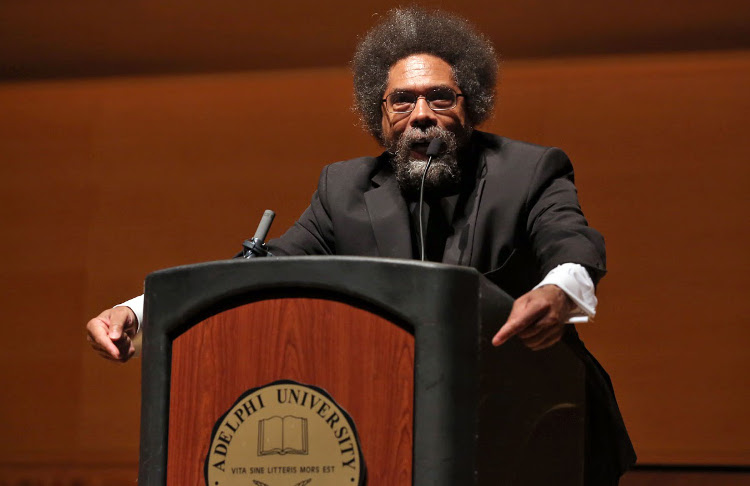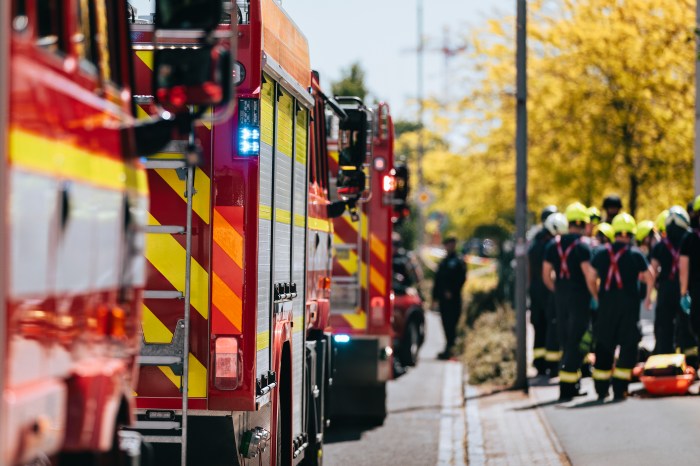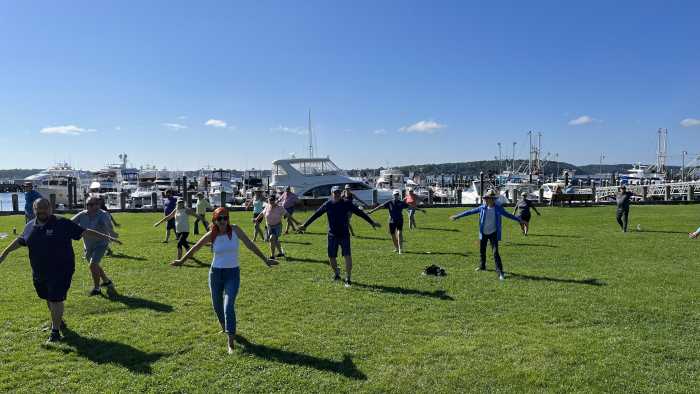Dr. Cornel West is sitting in the second row of the Performing Arts Center at Adelphi University on Thursday, listening to the gentle hymns from the Youth Choir of the Greater Allen Cathedral from Jamaica, Queens.
His feet are softly tapping the ground, his hands colliding as he claps to the beat. The music stops, and with a big smile on his face, West stands and extends his arms toward the heavens, his claps more emphatic. He’s the first to greet the kids upon their exit.
The choir was being led off stage by one of the most famed intellectuals in the world, an author, philosopher and professor, who seamlessly infuses poetry, religion, Greek philosophy, and spiritual messages into his must-hear speeches. He graduated Magna Cum Laude from Harvard and received his PHd from Princeton. Yet, it was West who was impressed, shaking his head in disbelief.
These days, West has a lot to shake his head about.
West was invited to speak at Adelphi for an event titled “The Art of Protest and the Celebration of Peace”—the first of approximately 20 such events that will go on throughout the year as part of the university’s project, dubbed “The Changing Nature of War and Peace.”
The famed, outspoken orator granted the Press an exclusive interview prior to his speech.
In a wide-ranging conversation, West professed support for Chelsea Manning and Edward Snowden, prophesying that the NSA whistleblower will one day be vindicated and slamming the government for prosecuting the very people, like Manning, who reveal what he said are war crimes and then fail to hold the perpetrators accountable; expressed concern over the ever-growing national security state; decried drone strikes as war crimes; and conveyed his concern about the disintegration of Americans’ civil liberties under the National Defense Authorization Act (NDAA), which some have argued gives the president carte blanche to detain US citizens, sans a trial or judicial review.
West, an author of more than a dozen books, called the decision by police in Ferguson, Mo. to reportedly leave Michael Brown’s lifeless body on the street for more than four hours in the sun disrespectful, and slammed corporate media for failing to properly understand why the black community responded the way it did.
West, once a supporter of President Obama, but no longer a fan, characterized Obama’s presidency as a failure.
“He’s had a lot coming at him, but I think for the most part he’s been unable to exemplify the kind of courage and vision that so many of us were excited about in 2008,” West told the Press. “This is true with regard to the prison industrial complex under Jim Crow, this is true in regard to massive unemployment still at work, this is true in regard to drones, which again I consider war crimes—killing innocent people—this is true in regard to Wall Street, and the Wall Street domination of his economy.
“Why Wall Street executives walk off scott free,” he wonders, his voice rising, “torturers walk off scott free, rule of law having very, very little status in that regard. I think those are major, major failures. It would make major failures of any presidential administration, not just his.”
Hunched over a chair in a small, mirrored room, West also declared “Occupy Wall Street is still alive,”—it’s now underground, he said, but was active during Hurricane Sandy and the recent push for an increased minimum wage—and credited the movement with starting a conversation about inequality in a way that hasn’t happened in more than three decades.
There’s very little that West is unable to—or doesn’t want to—discuss. And with the US currently involved in a seemingly indefinite drone war and with critics saying Americans’ civil liberties are being eroded by ongoing surveillance in the name of national security, there’s a lot on West’s mind.
And the list keeps growing.
On Aug. 9, 18-year-old Michael Brown was fatally shot six times, once in the head, by a Ferguson police officer in what police have said was an act of self defense.
Brown’s lifeless body was reportedly lying there for four and a half hours before it was driven away in an SUV.
“I think the perception, especially when you have brother Michael Brown’s body there for four and a half hours, and then when it was finally picked up it was kind of thrown into the old SUV and people could see it, regardless of what one’s interpretation of the facts may be there is a level of disrespect that was felt when you have a human being laying there with the blood flowing for four and a half hours in heat and then to have the body just thrown in the SUV like that,” he said.
“So I think the problem then becomes not just the matter of trust and distrust that the corporate media talks about, but also the sense of feeling so disrespected,” West added. “That brings back deep, deep subconscious and conscious memories of being black in America, of all the various ways in which being dishonored and being disrespected cuts at the very core of who one is as a human being, and that’s beyond the political.”
He also noted that the militarization of police, which was on full display during protests in Ferguson following Brown’s death, is emblematic of what’s going on in America today.
“There’s no doubt, we’ve got the three basic tendencies of our neo-liberal society now, which is to financialize, to militarize, and to privatize, and we saw the militarizing in this case of the local police,” West said. “But that militarizing is in some ways a peak of an iceberg: You got national surveillance, you got national security, keeping track of all of us, making it difficult to have any kind of genuine privacy, and then the ability to bring in such highly weaponized and militarized entities.
“It looked like tanks,” he continued, “it looked like Baghdad in that sense. And it’s been in place, of course since 9/11, under both Republican and Democratic administrations.”
West was sitting in the courtroom in Ft. Meade, Maryland last year when former Army Pvt. Chelsea Manning was facing a military tribunal for leaking 700,000 classified military and state department documents, including the so-called “Collateral Murder” video, which contained cockpit footage from a US Apache helicopter firing at civilians—and killing two Reuters journalists in the process—mistaken for insurgents, to the anti-secrecy website WikiLeaks. (So was the Press.)
“I was in the court twice with sister Manning because I’m very concerned about the violation of rights and liberties,” he said.
Manning was sentenced last August to 35 years in prison for the leaks; Those who fired upon civilians were never punished.
“It shows a degree of which there is a lack of accountability and answerability for those who are committing, in my view, war crimes, killing innocent civilians,” West added. “And the fact that the very person who points out the war crimes is the one who’s criminalized rather than than persons who are committing the war crimes…and it goes all the way up, it goes all the way up to the White House at that point.”
Also troubling, according to West, is the National Defense Authorization Act, which was challenged in court by a group of journalists and intellectuals, but the lawsuit was eventually dismissed when the Obama administration appealed a lower court’s ruling. The suit, led by Pulitzer Prize-winning journalist Chris Hedges, formerly of the New York Times, charged that Section 1021 of NDAA was written so broadly that the executive branch would have the power to detain American citizens without due process.
“Now under the National Defense Authorization Act you can actually detain people without judicial review, you can assassinate American citizens [under the Authorization to Use Military Force Act (AUMF), enacted after Sept. 11] without any kind of accountability whatsoever…that for me is a fundamental violation of the constitution,” West said.
A legal memo released in June by the Obama administration, which was under court order to do so, revealed that strikes that killed Anwar Al-Awlaki, a U.S. citizen who allegedly became the leader of an al-Qaeda offshoot in Yemen, was justified under AUMF and the “public authority justification,” which allows a government official to lawfully take lethal action. Samir Khan, who spent his teenager years in Westbury and has been accused of being the editor of an al-Qaeda propaganda magazine called Inspire, was killed in the same drone strike that took out Al-Awlaki, though government officials have said he wasn’t targeted.
The Obama administration has reportedly authorized drone strikes in Pakistan, Somalia, and Yemen, which have successfully taken out militants but have also killed dozens of civilians.
“The whole map becomes just an open season for US bombs and a violation of national sovereignty that we are dropping these bombs with these drones,” West said. “Again, when you talk about those who have declared war on the United States, I do draw a distinction, I’m not a pacifist like Martin [Luther] King [Jr.], I believe in just war—I would’ve fought against Hitler, if I was Korea I would’ve fought against the Japanese.
“I believe it’s just war against ISIS right now, that I would support,” he continued. “But at the same time, the killing of innocent civilians by individuals, murder by the state, are war crimes. No matter who it is. It could be Israel killing innocent civilians in Gaza, it could be Hamas killing innocent civilians in Tel Aviv, it could be the US government killing innocent civilians in Pakistan, Somalia.”
Defenders of mass surveillance at home and abroad often cite national security. But, West said Edward Snowden’s leaks were justified, because they revealed the government’s “lies” and “crimes.”
“I consider Edward Snowden the John Brown [a white abolitionist] of the national surveillance state,” he said. “He had the courage to sacrifice his all in the name of public interest, to disclose to us some of the lies of the American government and some of the crimes of the American government, and I think that’s the highest form of patriotism, actually.
“In that sense,” he added, “I wish he could come back [from Russia]. I think history would vindicate that claim.”
When it was time for West to give his speech, he took the stage to a thunderous ovation.
“What a blessing to be here!” he told his audience.
Professor Devin Thornburg, who with a group of students and other educators spent a year putting this and 20 other events slated for this year together, called West one of the most “humbled giants in the field of academics that I have ever met.”
“Typically scholars are not very broad in their scholarship,” he said. “And one of the things that marks him as a philosopher…he’s able to draw from multiple literatures and perspectives and philosophies, but in a way that makes them fresh again.”
West spoke about many of the same issues he did with this reporter, and even managed to quote Socrates, as well as Hebrew Scripture. He talked about how he benefited from having loving parents and about the need to have courage to think for yourself and to serve the “weak and vulnerable…which is very difficult in these hard times.”
“I’m here because someone loved me,” he added.
West got philosophical when he described the art of protest:
It’s about realizing “this is the kind of human being that I choose to be,” he said. “And it’s about love at the center of it that leads to a protest, that leads to a critique, leads to a resistance, leads to solidarity, open to all who make that choice; none of us caught within the prison house of our color, our gender, our sexual orientation, or even our class.”
“You have to be willing to risk your popularity in the name of your intellectual integrity,” West added, “that’s what we love about Socrates, that’s what education at its deepest level is all about.”
When he was done, West joined Adelphi students in singing “Freedom is Coming” from South Africa.
“Freedom is coming,” they sang. “Freedom is coming.”
“Freedom is coming. Oh yes, I know.”
Adelphi University’s “Changing Nature of War and Peace” events are open to the public. Click here for more information. The university is using the hashtag #AdelphiWarandPeace































